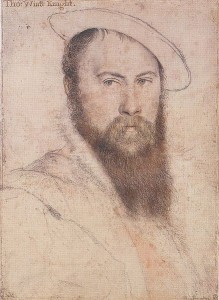 On this day in history, 11th October 1542, Sir Thomas Wyatt the Elder, poet and diplomat, died at Clifton Maybank House, the home of his friend Sir John Horsey, in Sherborne Dorset. He had been complaining of severe headaches since 1539 and he was just 39 years old at the time of his death.
On this day in history, 11th October 1542, Sir Thomas Wyatt the Elder, poet and diplomat, died at Clifton Maybank House, the home of his friend Sir John Horsey, in Sherborne Dorset. He had been complaining of severe headaches since 1539 and he was just 39 years old at the time of his death.
You can read more about this fascinating Tudor personality, a man who managed to escape Anne Boleyn’s fall in 1536 and who has become known as “the Father of English Poetry” and for introducing the sonnet into English, in my article Sir Thomas Wyatt the Elder.
Two excellent books on Wyatt are Susan Brigden’s Thomas Wyatt: The Heart’s Forest and Nicola Shulman’s Graven With Diamonds: The Many Lives of Thomas Wyatt: Poet, Lover, Statesman, and Spy in the Court of Henry VIII.
Also on this day in history…
- 1521 – The title of Fidei Defensor, “Defender of the Faith”, was conferred by Pope Leo X on Henry VIII. This was a reward for Henry VIII writing his pamphlet Assertio septem sacramentorum adversus Martinum Lutherum (Declaration of the Seven Sacraments Against Martin Luther), defending the Catholic Church against the works of Martin Luther.
- 1532 – Henry VIII and Anne Boleyn left England for Calais, where Anne was treated as Henry VIII’s Queen and consort. Click here to read more.
- 1537 – Solemn procession at St Paul’s to pray for the Queen, Jane Seymour, who was in labour, a labour which lasted over 30 hours. Charles Wriothesley wrote of how the procession was made up of “all the orders of friars, preistes, and clarkes… the major and aldermen, with all the craftes of the citie” and that it was “donne to pray for the Queene that was then in laboure of chielde.”
- 1549 – Arrest of Edward Seymour, the Duke of Somerset, Lord Protector of the Realm and Governor of the King’s Person. He was brought in front of Edward VI, who summarised his charges as “ambition, vainglory, entering into rash wars in mine youth, negligent looking on Newhaven, enriching himself of my treasure, following his own opinion, and doing all by his own authority, etc.” Click here to read more.
- 1551 – John Dudley, Earl of Warwick, became the Duke of Northumberland and Henry Grey, father of Lady Jane Grey, became the Duke of Suffolk.
- 1982 – The raising of the Mary Rose, Henry VIII’s ship, from the seabed just off the coast off Portsmouth where she had lain since she sank on 19th July 1545. Click here to read more about the Mary Rose.